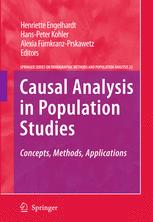

Most ebook files are in PDF format, so you can easily read them using various software such as Foxit Reader or directly on the Google Chrome browser.
Some ebook files are released by publishers in other formats such as .awz, .mobi, .epub, .fb2, etc. You may need to install specific software to read these formats on mobile/PC, such as Calibre.
Please read the tutorial at this link: https://ebookbell.com/faq
We offer FREE conversion to the popular formats you request; however, this may take some time. Therefore, right after payment, please email us, and we will try to provide the service as quickly as possible.
For some exceptional file formats or broken links (if any), please refrain from opening any disputes. Instead, email us first, and we will try to assist within a maximum of 6 hours.
EbookBell Team

4.4
52 reviewsThe central aim of many studies in population research and demography is to explain cause-effect relationships among variables or events. For decades, population scientists have concentrated their efforts on estimating the ‘causes of effects’ by applying standard cross-sectional and dynamic regression techniques, with regression coefficients routinely being understood as estimates of causal effects. The standard approach to infer the ‘effects of causes’ in natural sciences and in psychology is to conduct randomized experiments. In population studies, experimental designs are generally infeasible.
In population studies, most research is based on non-experimental designs (observational or survey designs) and rarely on quasi experiments or natural experiments. Using non-experimental designs to infer causal relationships—i.e. relationships that can ultimately inform policies or interventions—is a complex undertaking. Specifically, treatment effects can be inferred from non-experimental data with a counterfactual approach. In this counterfactual perspective, causal effects are defined as the difference between the potential outcome irrespective of whether or not an individual had received a certain treatment (or experienced a certain cause). The counterfactual approach to estimate effects of causes from quasi-experimental data or from observational studies was first proposed by Rubin in 1974 and further developed by James Heckman and others.
This book presents both theoretical contributions and empirical applications of the counterfactual approach to causal inference.